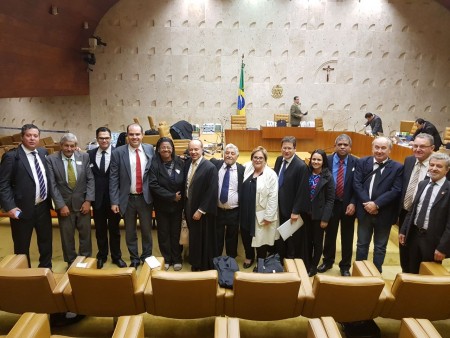Posted on August 25, 2017
Yesterday, the Brazilian Supreme Court finally handed down a decision that has been long awaited by the international ban asbestos community. This case has importance even beyond asbestos. It is a test of whether the Supreme Court will authorize state governments to go beyond what the federal government will do, to protect the people’s right to health and the environment under the 1988 Constitution.
More than 15 years after the onset of this case, the Court ruled by eight votes against two that the law prohibiting the use of asbestos in the state of São Paolo is constitutional and will stand!
This ruling is important for Brazil,: the other challenged local bans (states of Rio de Janeiro, Rio Grande do Sul and Pernambuco) will be similarly upheld by the Supreme Court and that will create a dynamic for other states in Brazil to ban chrysotile asbestos, thus effectively banning asbestos on brazilian territory.
This ruling is important for the global action against asbestos. Brazil is a major producer and exporter of asbestos — in fact, 95% of the asbestos imported into the U.S. comes from Brazil.
The other ruling of the Supreme Court is harder to analyze but equally stunning : the Supreme Court has, by five votes against four, voted unconstitutional the federal law dating from 1995 and allowing the use of chrysotile asbestos. This is a resounding victory tampered by the fact that the constitutional quorum to fully declare unconstitutionality (with immediate effect) would have been six votes. However those six votes were casted « incidentally » during the vote of the São Paulo law, as pointed out the eldest judge Minister Celse de Melo.
For decades, the anti-asbestos movement in Brazil, has been led by Fernanda Gianassi and the Associação Brasileira dos Expostos ao Amianto (ABREA). But, as we experience in the US, they have faced constant pushback on their policy efforts. This long, drawn out court case is just one example of such pushback.
Many of us have had the honor to be present at the early hearings related to this case back in 2012. Among the 18 witnesses testifying in support of the ban were Dr. Barry Castleman, Dr. Arthur Frank, and Fernanda Giannasi, who impressively presented the truth about the horrific consequences of asbestos use. Other exceptional witnesses included victims like Doracy Maggion, who contracted asbestosis as a result of working at an Eternit factory in Brazil for about two decades. In a heartbreaking moment, Mr. Maggion explained to the court, “I have two stones for lungs.”
This decision will undoubtedly hold influence over future asbestos policy and litigation both in Brazil and around the globe. As Dr. Richard Lemen discussed at the onset of the case in 2012, “You can rest assured that the testimonies will be replayed in U.S. courts over and over again.”
Please join me in applauding the fierce efforts of Fernanda, ABREA, and all those witnesses who have spoken out over the years. The fire in your fight is an inspiration to all of us, and we will continue to band together to forge toward our goal of a global ban on asbestos. Despite constant pushback from well-funded opponents, we have the truth, we are in the right, and TOGETHER we will make this world a safer place.
In solidarity,
Linda

